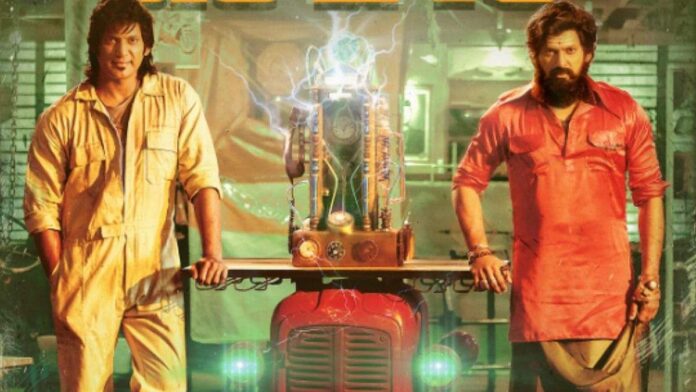A year or so ago, I caught this Korean film called The Call, about a woman being able to cut across time with a telephone call. At the time, I thought that such a story could be great material for a Tamil entertainer. Mark Antony, based on the idea of a telephone call that travels back in time to connect people, is two-and-a-half hours of me learning how wrong I was, and this, despite SJ Suryah playing so likeably to the gallery.
Director: Adhik Ravichandran
Cast: Vishal, SJ Suryah, Ritu Varma, Selvaraghavan
SJ Suryah is in a phase of his acting career where he can do little wrong. The man shows tremendous commitment to every moment, and where someone else might come through as laughably cartoonish (almost like they were parodying Sivaji Ganesan, what with the dialogue delivery being all stretched out), the actor’s sheer energy and a certain undefinable charisma ensures that we buy everything he does. There’s one enjoyable stretch in Mark Antony—perhaps the only one for me—in which he’s a hoot as he plays both father and a hilariously irate son who calls him from the future. But when you see even SJ Suryah struggle to sell certain ideas—like when he bizarrely begins mimicking a woman in an important scene—it’s a sign of a film that you might have to suffer through.
And boy, did I. First, and above all, the ridiculously noisy score. Everything in the film is an excuse for the background score to try to attack your hearing. In between generic tracks being played, you get a second or two of respite, but then, the characters step up with their screaming. You know that famous Ross scene in F.R.I.E.N.D.S where he makes a gesture with his hands to tell Joey and Chandler to keep it low? If he saw this film, he would be maniacally repeating that gesture across the film’s running time of 151 screaming minutes.
This film is also evidence that the Tarantino-esque idea of using old songs to spice up set-pieces might be on its death throes. We get ‘Panju mitaai selakatti’. We get ‘Kannai nambaadhe’. And most fittingly, doubling up as a warning to us, we get ‘Varudhu varudhu, velagu velagu…’ What once felt like stylised homages to our old music now feels like a lazy device, with great, old songs feeling exploited for their familiarity, with average film moments quietly sliding under the shadows of old musical greatness.
This is a period film, with a back-and-forth narrative that oscillates between the 70s and the 90s. And this means—you guessed it right—more throwaway references. Ajith Kumar has just made his debut in Amaravati; Shankar is called a ‘new filmmaker’; Walter Vetrivel has been released… There’s a reference to Ninaithadhai Mudippavan somewhere. But the film—and this reveals its soul—seems most excited in its recreation of ‘Silk’ Smitha and in her sexualisation. It sneaks in something about respecting the strength of Vijayalakshmi (Silk Smitha’s real name), but soon enough, it has her speaking with a sensual drawl, as a character, channelling, it seems, the energy of youth audiences, drools all over her.
Amid all the din, I kept thinking that the film and its central conceit might have benefitted from having a sobering presence somewhere. Vishal simply isn’t able to bring what Simbu was able to bring to, say, Maanaadu. I bring that film up for more than one reason: There’s the repetitive way in which the ‘time travel’ idea is used. There’s SJ Suryah really playing to the gallery, and in one stretch, waking up again and again to express disappointment. There’s even YG Mahendra here—playing a transwoman it seems—but in this film, his character exists to be mocked, including someone using that notorious line, ‘Avana nee?’. In such a film, is there any surprise that Ritu Varma, playing Ramya, gets relegated to the sidelines, oscillating between two lead characters for no convincing reason.
Now and then, in between the deafening screams and score, the film sneaks in an emotional scene or two: a father-son reunion, a mother-son conversation… And the background score laughably makes the sudden transition to something manipulatively melodious. But really, there’s no time or mental space to feel aggrieved about such choices because… the sensory assault is relentless. In a scene, Vishal, playing Antony, kneels in submission and it’s supposed to really move us because his wife is crying about it, but before you can decide whether to care or not, the film suggests that his character is possessed by a guardian deity called Karupanna Saamy… and that’s cue for more assault. In between, I spat my coke at a shot of Vishal running at the bad guys, getting juxtaposed with a horse running at them. I turned to the person next to me, my mind somewhere between confusion and convulsion, eager to share with some living person the strangeness of my theatrical experience.
There are a couple of striking ideas, which in a better film, might have resulted in more impact. The idea of juxtaposing two different fight scenes happening across time. The idea of someone getting blackmailed from the past. The idea of comparing two father-son relationships. But such ideas needed more fleshing out, more nuance and subtlety, and at least some occasional quiet. This isn’t that film. This is a film that seems to be OD-ing from start to finish: its characters are introduced too fast, its twists are presented and resolved too soon, and its background score is too loud. At some point, a character says, “Indha time-travel-a vechu nammala saavadikkaraanga (they are killing us with this idea of time-travel).” I may not go as far as to say that, but that’s partly because I won’t be talking for a while—not while the film’s background score is still ringing in my ears.
#Mark #Antony #Movie #ReviewSJ #Suryah #dazzles #film #fizzles #Cinema #express

